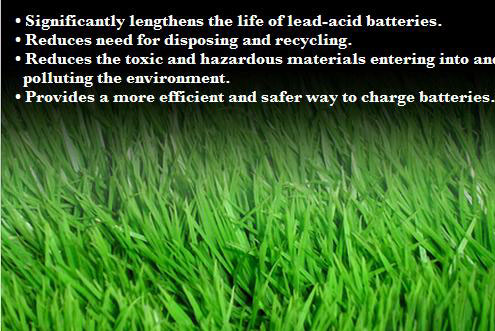TheWorldsBestBatteryCharger.com
Using this battery charger you can...Bring Dead Batteries
Back To Life!
These new radiant battery chargers are the world's best for charging and rejuvenating your batteries!
Green Battery Charger Tech Page
New battery charger technology can significantly reduce the environmental impacts of unnecessarily discarded batteries...
Do Your Part to Cleanup The Environment
Battery Life The average life of a liquid filled battery, depending on usage, is 6 to 48-months. According to a recent study, only 30% of all batteries actually reach the 48-month point. During discharge, lead sulfate is formed on the plates of the battery. While charging the sulfate is electrolytically removed from the plates. If the battery is not completely recharged after each use, this sulfation buildup increases slightly with each charge/load cycle. It impedes the battery's ability both to be charged and to deliver power. If the battery is overcharged, the battery will excessively heat, and shed its active plate material much faster than usual, causing the battery to fail prematurely. Radiant charging incorporates several innovative design technologies which minimize both undercharging and overcharging problems. There are many pulse charging systems on the market, all of which claim to provide a better and deeper charge, they still cannot compare to the radiant charge. The radiant charge, unlike all others, can effectively bring back an unchargeable highly sulfated battery to an almost new condition. In some cases outperforming a comparable new battery right off the shelf. Facts about Batteries and the Environment Americans purchase nearly 3 billion dry-cell batteries every year to power radios, toys, cellular phones, watches, laptop computers, and portable power tools. Nearly 99 million wet-cell lead-acid car batteries are manufactured each year. A typical lead-acid battery contains 60 to 80 percent recycled lead and plastic. On average, each person in the United States discards eight dry-cell batteries per year. Each year, Americans throw out almost 180,000 tons of batteries. About 14,000 of those tons are rechargeable batteries; the rest are single-use. Batteries are a unique product comprised of heavy metals some of which are toxic heavy metals such as nickel cadmium, alkaline, mercury, nickel metal hydride, and lead acid. These can threaten our environment if not properly discarded. Improperly disposed batteries may produce the following potential problems or hazards:
Batteries that end up in landfills and incinerators eventually leak into the environment and end up
in the food chain, causing serious health risks to humans and animals. By challenging current battery charging standards, Radiant technology can significantly reduce the environmental impacts of unnecessarily discarded batteries by keeping our landfills cleaner. 2008-2010 © TheWorldsBestBatteryCharger.com |
|
I just got one of your RC-2A12-2 chargers and I
LOVE it... It works exactly as advertised. Thanks again for a superb product, David J. A. |
|
|
|
Wow! I can't believe the power that is now in that battery. It was a weak drill before. I had to push so much harder than I do now. I am so impressed. So amazing. Joan R, Coeur D'Alene |
